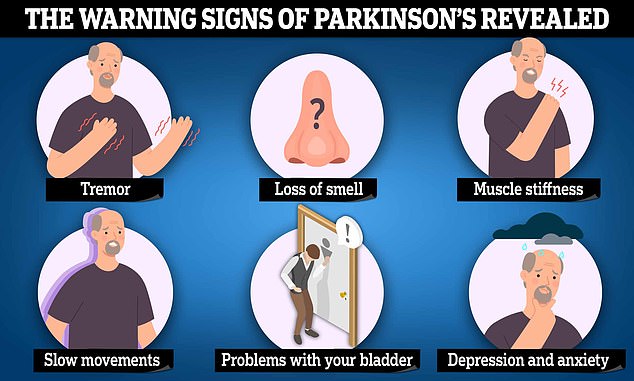A new implantable device regulated by a person’s brain activity could provide personalized care “around the clock” to those suffering from the debilitating symptoms of Parkinson’s disease.
The method, called adaptive deep brain stimulation, can treat daytime movement problems and nighttime insomnia, the researchers said.
Typically, deep brain stimulation (DBS) involves implanting thin wires called electrodes into the brain at specific locations that send electrical signals to help relieve symptoms.
However, conventional techniques provide a constant level of stimulation and can cause unwanted side effects because the brain does not always need the same intensity of treatment.
Experts believe the device is an improvement on current techniques that have been used for years to treat Parkinson’s, a neurodegenerative disease that President Joe Biden is speculated to suffer from.
Symptoms can include uncontrollable shaking, slow movements and muscle stiffness, but experts say they often only appear when around 80 percent of nerve cells have already been lost.
This new device uses data taken directly from a person’s brain and learns to adjust the level of stimulation in real time, effectively intervening when necessary to control symptoms.
For example, a patient who suffers from slower movements will show reduced signals in the brain linked to movement.
The device will detect when these brain signals fall below a certain threshold and respond with precisely calibrated pulses of electricity.
This stimulation, in turn, will immediately improve the patient’s movement speed.
Parkinson’s disease is a progressive neurological disorder that causes the deterioration and death of nerve cells that produce dopamine, a neurotransmitter that regulates body movements.
Without dopamine, patients have balance problems, whole-body tremors, stiff limbs and slow movements.
According to the Parkinson’s Foundation, approximately 90,000 Americans are diagnosed with Parkinson’s disease each year, and 10 to 20 percent are under age 50.
Experts are still not sure what causes Parkinson’s disease, although evidence suggests that genetic factors and environmental triggers such as exposure to harsh chemicals and pesticides could be to blame.
Several doctors told DailyMail.com they suspected Biden, 81, had Parkinson’s, though many insisted on remaining anonymous for fear of backlash.
However, Dr. W. Chris Winter, a neurologist in Virginia, and Dr. Abhi Kapuria, a neurologist at the University of North Carolina, told this website that they suspected the president was experiencing neurological problems.

Experts have speculated that President Joe Biden suffers from the neurodegenerative disease Parkinson’s.

A stiff gait can also be a symptom of Parkinson’s disease.

Walking difficulties affect approximately 90 percent of Parkinson’s patients.
Both refused to carry out an ‘online diagnosis’ and reiterated that they had not examined him personally.
But they said they suspected neurological problems. Dr. Winter said the president had a “rolling list” of the disease’s hallmark symptoms, from a stiff gait and balance problems to a muffled voice and slurred speech.
The president and the White House have repeatedly denied that Biden has Parkinson’s disease.
As part of a trial published in Nature Medicine, four Parkinson’s patients already receiving deep brain stimulation were asked what they thought was their most bothersome symptom.
In most cases, these were involuntary movements (tremors) or difficulty initiating movement.
Participants were then prepared to receive the new treatment alongside their existing DBS therapy, alternating between the two every few days.
The analysis found that the new device improved each participant’s most bothersome symptom by 50 percent, compared with conventional deep brain stimulation.
This is the first time that a so-called “closed-loop” brain implant technology has been shown to work in Parkinson’s patients while they go about their daily activities.
Lead author Dr Philip Starr, from the University of California, San Francisco, said: “This is the future of deep brain stimulation for Parkinson’s disease.”
The researchers said their findings mark a “major step forward” toward developing a system that adapts to a patient’s individual needs at any given time.
Dr Simon Little, who also worked on the device, said: “The big change we’ve made with adaptive deep brain stimulation is that we can detect, in real time, where a patient is on the spectrum of symptoms and allocate them the exact amount of stimulation they need.”


